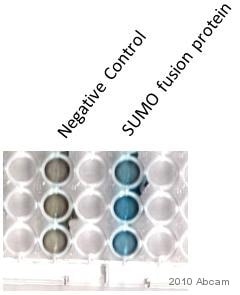Anti-Smt3 antibody (ab14405)
Key features and details
- Rabbit polyclonal to Smt3
- Suitable for: WB, ELISA
- Reacts with: Saccharomyces cerevisiae
- Isotype: IgG
Overview
-
Product name
Anti-Smt3 antibody -
Description
Rabbit polyclonal to Smt3 -
Host species
Rabbit -
Tested applications
Suitable for: WB, ELISAmore details -
Species reactivity
Reacts with: Saccharomyces cerevisiae -
Immunogen
Recombinant protein (S. cerevisiae).
-
Positive control
- Most yeast cell lysates can be used as a positive control without induction or stimulation.
-
General notes
Centrifuge product if not completely clear after standing at room temperature.
Properties
-
Form
Liquid -
Storage instructions
Shipped at 4°C. Store at +4°C short term (1-2 weeks). Upon delivery aliquot. Store at -20°C or -80°C. Avoid freeze / thaw cycle. -
Storage buffer
Preservative: 0.01% Sodium azide
Constituents: 0.42% Potassium phosphate, 0.87% Sodium chloride -
 Concentration information loading...
Concentration information loading... -
Purity
IgG fraction -
Purification notes
This product is an IgG fraction antibody purified from monospecific antiserum by a multi-step process which includes delipidation, salt fractionation and ion exchange chromatography followed by extensive dialysis. Assay by immunoelectrophoresis resulted in a single precipitin arc against anti-Rabbit serum. -
Clonality
Polyclonal -
Isotype
IgG -
Research areas
Images
-
All lanes : Anti-Smt3 antibody (ab14405) at 1/1000 dilution
Lane 1 : 3 : 5 : 7 : 9 : 11 : 13, Lysate prepared from E.coli expressed Yeast SUMO protein and SUMO-GFP fusion protein after incubation with lysed insect cells
Lane 2 : 4 : 6 : 8 : 10 : 12 : 14, Lysate prepared from SUMO-GFP fusion protein after incubation with lysed insect cells in the presence of 2% SDS
Lysates/proteins at 2 µg per lane.
-
ab14405 detecting Smt3 in Escherichia coli recombinant protein (BL21(DE3) by Direct ELISA. Wells were coated with 10µg each of diluted control protein (without SUMO fusion - Negative Controls) and target protein (with SUMO fusion protein) in bicarbonate buffer. Wells were blocked with 5% milk for 1 hour at room temperature. The samples were incubated with primary antibody (1/5000 in TBST +5% milk) for 45 minutes. An HRP-conjugated goat polyclonal to rabbit IgG (1/40000) was used as the secondary antibody.







